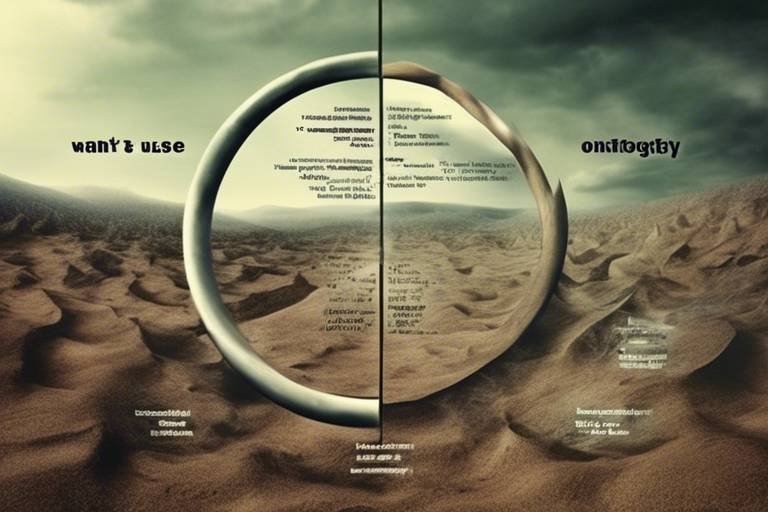Does Ontology Determine Our Understanding of Things?
Have you ever stopped to think about how we perceive the world around us? It's a fascinating question, and at the heart of it lies the concept of ontology. Ontology, in simple terms, is the study of being and existence. It’s like the lens through which we view reality, influencing not only our thoughts but also our actions and interactions. Imagine wearing a pair of glasses that alters your vision—this is essentially what ontology does to our understanding of things. Different ontological frameworks can profoundly shape how we interpret our experiences, leading us to see the world in unique and sometimes conflicting ways.
When we talk about ontology, we’re diving into a rich tapestry of philosophical inquiry. Think of it as a map that guides us through the complex terrain of existence. Depending on the ontological framework we adopt, our understanding of concepts like truth, reality, and even our own identity can shift dramatically. For instance, if you subscribe to a realist perspective, you might believe in an objective reality that exists independent of our thoughts and perceptions. In contrast, an idealist might argue that reality is largely shaped by our mental constructs, suggesting that our understanding is filtered through our consciousness.
The implications of these differing viewpoints are profound. They can influence everything from our everyday decisions to the way we conduct scientific research. For example, a scientist operating under a realist ontology may focus on uncovering universal laws of nature, while one who leans towards idealism might prioritize the subjective experiences of individuals. This divergence in thought can lead to different methodologies, interpretations, and ultimately, conclusions about the world we inhabit.
Moreover, ontology doesn't just reside in the realm of philosophy; it seeps into our daily lives and interactions. Consider how cultural backgrounds can influence our ontological beliefs. In some cultures, the interconnectedness of all beings may be emphasized, leading to a more relational understanding of existence. In others, individualism might reign supreme, shaping a more isolated perspective. This interplay between ontology and culture enriches our understanding of human experience, reminding us that our perceptions are often colored by the societal frameworks we inhabit.
In conclusion, ontology is not merely an abstract concept confined to academic discussions; it is a vital part of how we navigate and interpret our reality. By recognizing the different ontological frameworks that exist, we can better understand the diverse ways in which people perceive and engage with the world. So, next time you find yourself pondering the nature of existence, remember that the way you view it is likely shaped by the ontological lens you wear. Are you ready to explore your own understanding of things?
- What is ontology? Ontology is the philosophical study of the nature of being, existence, and reality.
- How does ontology influence our understanding? Different ontological frameworks shape our perceptions, beliefs, and interactions with the world.
- What are some examples of ontological frameworks? Realism, idealism, and constructivism are prominent examples of ontological frameworks.
- Why is ontology important in scientific inquiry? Ontological assumptions influence how researchers conceptualize phenomena and interpret data.

The Role of Ontology in Philosophy
Ontology, the study of being and existence, serves a pivotal role in the realm of philosophy. It delves into the very essence of what it means to exist, prompting us to ask profound questions like, "What is real?" and "What is the nature of existence?" This branch of philosophy lays the groundwork for various philosophical inquiries, influencing how we perceive reality and our place within it. Just as a map guides a traveler through unknown terrain, ontology provides a framework for understanding the complexities of existence.
At its core, ontology examines the categories of being and their relationships. It seeks to answer questions about the nature of objects, properties, space, and time. By doing so, ontology influences other philosophical domains, such as epistemology (the study of knowledge) and metaphysics (the study of the fundamental nature of reality). For example, when we explore the concept of truth, our ontological beliefs shape how we define and understand that truth. If we believe in an objective reality, our interpretation of truth will differ significantly from someone who subscribes to a more subjective view.
Consider the implications of ontology in everyday life. Our ontological beliefs can shape our interactions and perceptions. For instance, if someone believes that reality is fundamentally material, they may prioritize scientific explanations over spiritual ones. Conversely, someone who embraces an idealistic perspective might find meaning in personal experiences and consciousness. This interplay between ontology and our understanding of reality creates a rich tapestry of interpretations and beliefs.
To illustrate the significance of ontology in philosophy, we can categorize its role into several key aspects:
- Foundation of Philosophical Inquiry: Ontology provides the necessary groundwork for other philosophical discussions, allowing for a structured exploration of existence.
- Influence on Other Disciplines: The principles of ontology extend beyond philosophy, impacting fields like science, psychology, and sociology.
- Framework for Understanding Reality: By establishing categories of existence, ontology helps us navigate complex concepts like identity, change, and causality.
In summary, ontology is not just an abstract branch of philosophy; it is a fundamental lens through which we view and interpret the world. As we continue to explore the depths of existence and our understanding of it, ontology remains a crucial player in shaping our philosophical landscape. So, the next time you ponder the nature of reality, remember that ontology is the compass guiding your thoughts.

When we dive into the world of ontology, we quickly realize that it isn't just a dry academic subject; it's a vibrant tapestry of ideas that shapes our understanding of existence itself. Different ontological frameworks provide us with unique lenses through which we can interpret the world around us. These frameworks are like various colors on an artist's palette, each contributing to the rich picture of reality. Let's explore some of the most prominent ontological frameworks: realism, idealism, and constructivism.
Realism is one of the most straightforward frameworks. It posits that there is an objective reality that exists independently of our perceptions. Think of it as a solid rock in the middle of a stream; regardless of how the water flows around it, the rock remains unchanged. Realists argue that our senses can lead us to discover truths about this reality. This perspective has profound implications, especially in scientific inquiry, where empirical evidence is paramount. For instance, in a scientific experiment, a realist would assert that the results reflect an objective truth about the natural world.
On the other hand, we have idealism, which takes a more subjective approach. Idealists believe that reality is fundamentally shaped by our perceptions and thoughts. Imagine a painter creating a masterpiece; the painting exists only in the artist's mind until it is put onto canvas. In this sense, idealism suggests that our understanding of reality is constructed through our consciousness. This framework can lead to diverse interpretations of the same phenomenon, as each individual’s mental constructs can vary widely. For example, two people might witness the same event but interpret it differently based on their personal experiences and beliefs.
Then, there’s constructivism, which emphasizes the social dimensions of knowledge. This framework posits that our understanding of reality is constructed through interactions with others and our cultural context. It’s like building a house; each brick represents a piece of knowledge, and the final structure is a collaborative effort influenced by the builders' backgrounds and experiences. Constructivism highlights how our perceptions are not only shaped by individual experiences but also by the societal norms and values that surround us. This perspective encourages a more inclusive understanding of knowledge, recognizing that different cultural backgrounds can lead to vastly different interpretations of the same reality.
To summarize, these ontological frameworks provide us with different ways to comprehend existence:
| Framework | Key Concept | Implications |
|---|---|---|
| Realism | Objective reality exists independently of perception | Supports empirical research and universal truths |
| Idealism | Reality is shaped by mental constructs | Emphasizes subjective interpretations of experiences |
| Constructivism | Knowledge is constructed through social interactions | Highlights the influence of culture and society on understanding |
Understanding these frameworks is crucial for navigating complex philosophical discussions and for appreciating the diversity of human thought. Each framework offers valuable insights into how we perceive our surroundings and interact with others, ultimately shaping our collective understanding of reality.
- What is ontology? Ontology is a branch of philosophy that studies the nature of being, existence, and reality.
- How do different ontological frameworks affect our understanding? Each framework—realism, idealism, and constructivism—provides a unique perspective that influences how we interpret experiences and knowledge.
- Can these frameworks coexist? Yes, many people find value in integrating elements from multiple frameworks to form a more comprehensive understanding of reality.

The clash between realism and idealism is like the age-old debate of whether the glass is half full or half empty. It’s not just a philosophical squabble; it’s a fundamental divergence in how we perceive and interpret the world around us. At its core, realism asserts that an objective reality exists independent of our perceptions. This means that there are truths out there waiting to be discovered, much like treasures buried beneath the surface. Realists believe that through observation and empirical research, we can uncover these truths, leading to a more profound understanding of the universe.
On the flip side, idealism argues that reality is shaped by our mental constructs. Imagine a painter with a blank canvas; the colors and forms they choose to create are influenced by their thoughts and feelings. In this sense, idealism suggests that our understanding of reality is not just influenced by external factors, but is also deeply rooted in our subjective experiences. This perspective emphasizes that what we perceive as reality is, in fact, a reflection of our consciousness and not merely a direct representation of the outside world.
The implications of these two frameworks are vast. For instance, in scientific contexts, realism encourages researchers to seek out universal laws and truths that apply across various contexts, suggesting that with the right tools, we can uncover the fabric of reality. Conversely, idealism invites scientists to consider how their own biases, experiences, and cultural backgrounds might shape their interpretations of data. This can lead to a more nuanced understanding of phenomena, as it recognizes that different observers may draw different conclusions from the same set of facts.
To further illustrate these differences, consider the following table that summarizes key distinctions between realism and idealism:
| Aspect | Realism | Idealism |
|---|---|---|
| Nature of Reality | Objective and independent of perception | Subjective and shaped by consciousness |
| Truth | Universal truths exist | Truth is relative and varies by individual |
| Methodology | Empirical observation and scientific inquiry | Interpretation through personal and cultural lenses |
| Examples | Classical physics | Phenomenology, existentialism |
In summary, the debate between realism and idealism is not just academic; it has real-world implications for how we approach knowledge, science, and our daily lives. Understanding these perspectives can help us navigate the complexities of existence, whether we’re trying to solve a scientific problem or simply making sense of our own experiences. So, which side do you lean towards? Are you a realist seeking to uncover the objective truths of the universe, or an idealist who believes that our perceptions shape our reality?
- What is realism in philosophy? Realism is the belief that an objective reality exists independently of our perceptions and that it can be understood through observation and empirical research.
- What does idealism propose? Idealism posits that reality is shaped by our mental constructs and that our understanding of existence is influenced by our subjective experiences.
- How do realism and idealism impact scientific inquiry? Realism encourages the search for universal truths through empirical methods, while idealism emphasizes the subjective nature of interpretation, affecting how data is understood.
- Can someone be both a realist and an idealist? Yes, many people find value in both perspectives, recognizing that while there may be objective truths, our understanding of those truths is often influenced by personal and cultural contexts.

Realism, as a philosophical stance, carries significant implications for how we perceive and interact with the world around us. By asserting that an objective reality exists independent of our perceptions, realism encourages a mindset that seeks to understand and align with this reality. This perspective is particularly influential in scientific inquiry, where the quest for universal truths and consistent laws of nature becomes paramount. Think of realism as a sturdy bridge, connecting our observations with the tangible world that exists beyond our subjective experiences.
One of the most striking implications of realism is its impact on scientific methodologies. Researchers operating under a realist framework tend to prioritize empirical evidence and observable phenomena. This inclination fosters a rigorous approach to inquiry, where hypotheses are tested against measurable outcomes. For instance, in fields like physics or biology, scientists strive to uncover the laws that govern natural processes, believing these laws exist regardless of human thought or interpretation. This objective stance not only drives innovation but also enhances the credibility of scientific findings, as they are grounded in a reality that can be universally acknowledged.
Moreover, realism promotes a shared understanding among individuals engaged in scientific discourse. When scientists agree on the existence of an objective reality, they can collaborate more effectively, building on each other's findings to create a comprehensive picture of the world. This collaboration is crucial in interdisciplinary research, where different fields converge to tackle complex problems. For example, the intersection of biology and environmental science relies heavily on a realist perspective to address issues like climate change, as researchers from both domains work together to understand how physical laws interact with living systems.
However, the implications of realism extend beyond the scientific realm. In everyday life, adopting a realist viewpoint can encourage critical thinking and skepticism. By recognizing that our perceptions may be flawed or limited, individuals are more likely to question assumptions and seek evidence before forming conclusions. This critical approach is essential in an age where misinformation can spread rapidly, as it empowers people to discern fact from fiction and make informed decisions.
In summary, the implications of realism are profound and far-reaching. They shape not only scientific inquiry but also our everyday interactions with the world. By fostering a commitment to objective truth and empirical evidence, realism lays the groundwork for meaningful discoveries and collaborative efforts. However, embracing realism also requires a willingness to challenge our perceptions and engage in critical thinking, making it a powerful tool for understanding the complexities of existence.
- What is realism in philosophy? Realism is the belief that an objective reality exists independent of our perceptions and thoughts.
- How does realism influence scientific research? Realism encourages the use of empirical evidence and observable phenomena, leading to rigorous methodologies and credible findings.
- Can realism coexist with other philosophical frameworks? Yes, realism can be integrated with other perspectives, such as constructivism or idealism, to provide a more comprehensive understanding of existence.
- Why is critical thinking important in a realist framework? Critical thinking helps individuals question assumptions and seek evidence, which is essential for discerning truth in a complex world.

Idealism, at its core, suggests that our understanding of reality is fundamentally shaped by our mental constructs. This means that the world we perceive is not merely a reflection of an objective reality but is instead filtered through our thoughts, beliefs, and experiences. Imagine looking through a pair of colored glasses; the world you see is tinted by the color of the lenses. In a similar way, idealism posits that our consciousness plays a crucial role in shaping our reality. This perspective has profound implications for how we interpret our experiences and interact with the world around us.
One of the most significant implications of idealism is the emphasis on subjectivity. Since reality can be seen as a mental construct, it follows that different individuals may interpret the same event in vastly different ways based on their unique perspectives. For instance, two people witnessing a sunset may experience it differently—one might see it as a beautiful end to the day, while the other may feel a sense of melancholy. This subjectivity highlights the importance of personal experiences and emotions in shaping our understanding of existence.
Furthermore, idealism encourages us to consider the role of culture and society in shaping our perceptions. What we believe to be true is often influenced by the cultural narratives and social contexts we inhabit. For example, in some cultures, the concept of time is linear, while in others, it may be viewed as cyclical. These differing perspectives can lead to varied interpretations of events and experiences, illustrating how our understanding is constructed through social interactions.
Moreover, idealism challenges the notion of a single, unchanging truth. Instead, it suggests that truths are fluid and can evolve over time as our perceptions change. This perspective can lead to a more open-minded approach to knowledge, encouraging dialogue and collaboration among individuals with different viewpoints. In essence, idealism promotes the idea that understanding is a dynamic process rather than a static one, allowing for growth and transformation in our comprehension of reality.
In summary, the implications of idealism extend beyond mere philosophy; they permeate our everyday lives. By recognizing that our understanding of reality is shaped by our mental constructs, we can foster greater empathy and appreciation for the diverse perspectives of others. This awareness encourages us to engage in meaningful conversations and seek common ground, ultimately enriching our collective understanding of the world.
- What is idealism? Idealism is a philosophical perspective that posits that reality is mentally constructed and shaped by our perceptions and consciousness.
- How does idealism differ from realism? While realism asserts that an objective reality exists independent of our perceptions, idealism suggests that our understanding of reality is influenced by our mental constructs.
- What are the implications of idealism for scientific inquiry? Idealism encourages a subjective approach to understanding phenomena, suggesting that interpretations of data may vary based on individual perspectives.
- Can idealism coexist with other philosophical frameworks? Yes, many philosophers integrate elements of idealism with other frameworks, recognizing the complexity of human understanding.

Constructivism is a fascinating ontological framework that reshapes our understanding of knowledge and reality. At its core, constructivism posits that knowledge is not merely discovered but is actively constructed through our interactions with the world and each other. This perspective challenges the traditional notion of objective truth, suggesting instead that our realities are shaped by our experiences, social contexts, and cultural backgrounds. Imagine building a house: the materials you choose, the design you envision, and the environment you’re in all influence the final structure. Similarly, our understanding of the world is built from the bricks of our experiences and the mortar of social interactions.
This framework has profound implications for various fields, especially education and social sciences. In educational settings, for example, constructivism encourages an interactive learning environment where students are not passive recipients of information but active participants in their learning journey. They engage with peers, share perspectives, and collaboratively construct knowledge. This approach fosters critical thinking and adaptability, skills that are essential in our rapidly changing world.
Moreover, constructivism highlights the importance of context. What one individual perceives as reality may differ significantly from another's viewpoint, influenced by factors such as culture, history, and personal experiences. For instance, a historical event may be interpreted differently by various communities based on their collective memories and narratives. This subjectivity underscores the idea that our understanding is not only personal but also socially constructed.
To illustrate the impact of constructivism further, consider the following table that summarizes its key features compared to traditional views:
| Aspect | Constructivism | Traditional View |
|---|---|---|
| Nature of Knowledge | Constructed through experiences and interactions | Discovered as objective truth |
| Role of Learner | Active participant in learning | Passive recipient of information |
| Understanding of Reality | Subjective and influenced by context | Objective and universal |
| Educational Approach | Collaborative and interactive | Lecture-based and individualistic |
In summary, constructivism significantly impacts how we perceive and engage with the world. It invites us to recognize the diversity of perspectives and the richness that comes from our shared experiences. By embracing this framework, we can foster a deeper understanding of ourselves and others, paving the way for more meaningful interactions and collaborations.
- What is constructivism? Constructivism is an ontological framework that suggests knowledge is constructed through social interactions and individual experiences.
- How does constructivism affect education? It encourages active learning, where students engage with each other to build knowledge collaboratively rather than passively receiving information.
- Why is context important in constructivism? Context shapes our perceptions and interpretations, leading to diverse understandings of reality based on cultural and social backgrounds.
- Can constructivism apply to scientific inquiry? Yes, constructivism influences how researchers interpret data and understand phenomena, emphasizing the role of subjective experience in knowledge creation.

Ontology plays a crucial role in scientific inquiry, acting as a lens through which researchers conceptualize phenomena and categorize knowledge. When scientists embark on their quest for understanding, the ontological assumptions they hold can significantly influence their approach to research. For instance, consider how different ontological views can lead to varied interpretations of the same data. A researcher who views reality through a realist lens might focus on objective measurements and universal laws, while one who subscribes to an idealist perspective might emphasize subjective experiences and the role of consciousness in shaping understanding.
This divergence in ontological viewpoints can lead to distinct methodologies. For example, a scientist grounded in realism may prioritize quantitative methods, seeking to uncover universal truths through statistical analysis. In contrast, an idealist might lean toward qualitative approaches, exploring the richness of human experience and the meanings individuals assign to their realities. Therefore, understanding the ontological framework that underpins a study is essential for critically evaluating its claims and implications.
Moreover, the evolution of scientific ontologies reflects broader shifts in how we comprehend the natural world. As science progresses, so too does our understanding of existence and reality. The transition from classical mechanics to quantum physics serves as a prime example. In classical mechanics, the universe was viewed as a predictable machine governed by clear laws. However, the advent of quantum physics introduced a more complex and nuanced ontology, where particles can exist in multiple states and where observation plays a critical role in determining outcomes. This shift not only revolutionized physics but also challenged our fundamental notions of reality, highlighting the importance of ontological considerations in scientific advancement.
To further illustrate the impact of ontology in scientific inquiry, let's take a look at the following table that summarizes how different ontological perspectives influence scientific methodologies:
| Ontological Perspective | Methodological Approach | Implications for Research |
|---|---|---|
| Realism | Quantitative Methods | Focus on objective measurement and universal laws |
| Idealism | Qualitative Methods | Emphasis on subjective experiences and meanings |
| Constructivism | Mixed Methods | Integration of subjective and objective perspectives through social contexts |
As we can see, ontology not only shapes how scientists conduct their research but also influences the very questions they choose to explore. By recognizing the underlying ontological assumptions, researchers can foster a more nuanced understanding of their findings and engage in meaningful interdisciplinary dialogue. This is particularly vital in an age where scientific collaboration across various fields is becoming increasingly common.
- What is ontology in scientific research?
Ontology in scientific research refers to the study of the nature of being and existence, influencing how researchers conceptualize and categorize knowledge.
- How do different ontological frameworks affect research outcomes?
Different ontological frameworks can lead to varied interpretations of data, influencing methodologies, research questions, and ultimately the conclusions drawn from studies.
- Why is it important to understand ontological assumptions?
Understanding ontological assumptions is vital for critically evaluating scientific claims and fostering interdisciplinary dialogue, as it reveals the underlying beliefs that shape research approaches.

When diving into the world of research, it’s crucial to recognize that our ontological assumptions significantly influence how we interpret data and understand phenomena. At its core, ontology deals with the nature of being and existence, and these assumptions dictate what researchers consider to be 'real' or 'true' in their studies. For instance, a researcher who believes in a realist ontology might approach a study with the conviction that there is an objective reality that can be observed and measured. This perspective often leads to methodologies that prioritize quantitative data, where numbers and statistics reign supreme.
On the flip side, a researcher grounded in an idealistic ontology may argue that reality is shaped by our perceptions and mental constructs. This can lead to qualitative methodologies that focus on understanding experiences and interpretations, rather than seeking universal truths. Such a stark contrast raises an essential question: how do our beliefs about existence shape the very questions we ask in our research?
To further illustrate, let’s consider a few common ontological assumptions in research:
- Realism: Assumes an objective reality independent of human perception.
- Idealism: Suggests that reality is mentally constructed and subjective.
- Constructivism: Proposes that knowledge is a product of social interactions and cultural contexts.
Understanding these assumptions is vital for researchers as they not only inform the choice of methodology but also shape how findings are interpreted and communicated. For example, a realist might focus on generalizable findings, while an idealist might emphasize the unique context of each study. This divergence can lead to misunderstandings or conflicts between different fields of study, especially when researchers from varying ontological backgrounds attempt to collaborate.
Moreover, these ontological assumptions can have profound implications for the broader landscape of knowledge. They influence not just individual studies but also entire disciplines. For instance, in the social sciences, a constructivist approach might lead to a focus on narratives and personal experiences, challenging traditional scientific norms that prioritize objectivity. As such, recognizing and articulating one’s ontological stance is not merely an academic exercise; it’s an essential step in fostering meaningful dialogue and collaboration across disciplines.
In conclusion, ontological assumptions in research are not just theoretical musings; they are the bedrock upon which our understanding of reality is built. By critically examining these assumptions, researchers can better navigate the complexities of their inquiries and contribute to a more nuanced understanding of the world around us.
- What is ontology in research?
Ontology in research refers to the study of the nature of being and existence, influencing how researchers perceive and interpret reality. - How do ontological assumptions affect research outcomes?
Ontological assumptions shape methodologies, data interpretation, and the overall conclusions drawn from research, leading to different understandings of the same phenomena. - Can different ontological frameworks coexist in research?
Yes, different ontological frameworks can coexist, leading to diverse interpretations and enriching the discourse within and across disciplines.

The evolution of scientific ontologies is a fascinating journey that mirrors humanity's quest for understanding the universe. From the early days of classical mechanics, where the universe was perceived as a grand clockwork mechanism, to the mind-bending realms of quantum physics, our ontological perspectives have undergone profound transformations. Each shift in scientific thought has not only altered our understanding of physical phenomena but has also reshaped the very frameworks through which we interpret reality.
In classical mechanics, ontology was grounded in the belief that the universe operates according to fixed laws, much like a well-oiled machine. This perspective fostered a sense of certainty and predictability, leading to significant advancements in technology and engineering. However, as scientists delved deeper into the atomic and subatomic realms, they encountered phenomena that defied classical explanations. This realization prompted a reevaluation of ontological assumptions, paving the way for the development of quantum mechanics.
Quantum mechanics introduced a radically different ontological framework, one that challenges our intuitive understanding of reality. Here, particles can exist in multiple states simultaneously, and their properties are not determined until they are observed. This shift raised profound questions about the nature of existence itself. Are objects real independent of observation, or do they rely on consciousness for their existence? Such inquiries illustrate how ontological evolution is not merely an academic exercise; it influences how we perceive the world and our place within it.
As we journey through the evolution of scientific ontologies, we can identify several key milestones:
| Era | Ontological Perspective | Key Developments |
|---|---|---|
| Classical Mechanics | Objective Realism | Newton's Laws, Determinism |
| Quantum Mechanics | Probabilistic Ontology | Wave-Particle Duality, Uncertainty Principle |
| Relativity | Non-absolute Ontology | Time Dilation, Space-Time Continuum |
| Modern Physics | Emergent Ontology | String Theory, Quantum Field Theory |
Each of these ontological frameworks has implications far beyond the realm of physics. They influence everything from technological advancements to philosophical discussions about the nature of reality. For instance, the emergence of quantum theory has led to practical applications in quantum computing and cryptography, demonstrating how shifts in our understanding can yield tangible benefits.
Furthermore, the evolution of scientific ontologies encourages interdisciplinary dialogue. As different fields grapple with the implications of these ontological shifts, we find ourselves at the intersection of science, philosophy, and even art. This interconnectedness highlights the importance of understanding ontology in a broader context, as it shapes not only our scientific inquiries but also our cultural narratives and ethical considerations.
In conclusion, the evolution of scientific ontologies is a testament to our ever-evolving understanding of reality. As we continue to explore the mysteries of the universe, it is crucial to remain open to new perspectives and interpretations. After all, the way we conceptualize existence profoundly influences our interactions with the world, shaping everything from scientific research to our everyday experiences.
- What is ontology? Ontology is the philosophical study of the nature of being, existence, and reality.
- How do ontological frameworks influence science? Different ontological frameworks shape how researchers conceptualize phenomena, impacting their methodologies and interpretations.
- What are some examples of ontological frameworks? Common frameworks include realism, idealism, and constructivism, each offering unique perspectives on existence.
- Why is understanding ontology important? Understanding ontology helps us critically evaluate scientific claims and fosters interdisciplinary collaboration.
Frequently Asked Questions
- What is ontology?
Ontology is a branch of philosophy that studies the nature of being, existence, and reality. It seeks to answer fundamental questions about what entities exist and how they can be categorized and related within a framework of understanding.
- How does ontology influence our understanding of reality?
Ontology shapes our perceptions by providing frameworks through which we interpret experiences. Different ontological perspectives, like realism and idealism, can lead to vastly different understandings of what is real and how we interact with the world around us.
- What are the main types of ontological frameworks?
The primary ontological frameworks include realism, idealism, and constructivism. Realism asserts an objective reality, idealism suggests that reality is mentally constructed, and constructivism emphasizes that knowledge is built through social interactions and experiences.
- What is the difference between realism and idealism?
The key difference lies in their view of reality. Realism posits that an objective reality exists independent of our perceptions, while idealism argues that reality is shaped by our thoughts and perceptions, leading to subjective interpretations of truth.
- How does ontology impact scientific inquiry?
Ontology plays a crucial role in scientific inquiry by influencing how researchers conceptualize phenomena and categorize knowledge. Different ontological assumptions can lead to varying interpretations of data, shaping the methodologies used in research.
- What are ontological assumptions in research?
Ontological assumptions are beliefs about the nature of reality that guide researchers in their studies. These assumptions affect how they approach their research questions, methodologies, and interpretations of findings, making it essential to recognize them for critical evaluation.
- How have scientific ontologies evolved over time?
The evolution of scientific ontologies reflects shifts in understanding reality, such as moving from classical mechanics to quantum physics. These changes in perspective have significant implications for how we interpret natural phenomena and conduct scientific research.



















